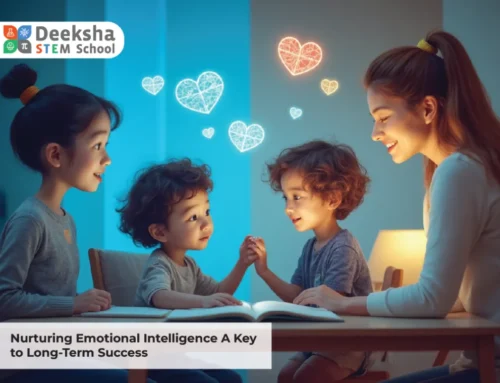Introduction
In today’s rapidly evolving technological landscape, the demand for skilled professionals in fields like robotics, coding, and artificial intelligence is growing at an unprecedented rate. As the world becomes more digital and automated, understanding how machines work, and how to program them, will be a vital skill for the next generation.
One of the best ways to prepare children for the future is to expose them to robotics and coding early on. Early exposure to these skills not only helps children develop a strong foundation in technology but also enhances their problem-solving, logical thinking, and creativity—all of which are critical in shaping their future career paths. In this blog, we’ll explore how learning robotics and coding at a young age can positively influence your child’s career prospects and life skills.
The Importance of Early Exposure to Robotics and Coding
Fosters Problem-Solving Skills
- Robotics and coding require children to break down problems and find logical, step-by-step solutions. When children engage in these activities, they learn how to think analytically, identify issues, and develop solutions through trial and error.
- By learning to code and program robots, children develop critical thinking skills that extend beyond the tech world, helping them tackle challenges in other academic subjects and real-life situations.
Encourages Creativity and Innovation
- Robotics and coding are not just about following instructions—they’re about creating something new. These fields encourage children to imagine and build solutions from scratch, sparking their creativity and fostering innovation.
- Whether it’s designing a robot to solve a specific problem or writing code to bring an app or game to life, children are encouraged to think outside the box, experiment, and refine their ideas. This creativity nurtures an entrepreneurial mindset that can be valuable in almost any career.
Prepares for Future Careers
- The job market of the future will be dominated by technology. Professions related to robotics, coding, artificial intelligence (AI), data science, and machine learning are already some of the fastest-growing sectors.
- Introducing your child to robotics and coding at an early age gives them a head start in understanding these technologies, positioning them well for careers in engineering, software development, robotics, and beyond.
- Early exposure helps children develop a passion for STEM (Science, Technology, Engineering, and Mathematics) fields, setting them on a path to careers that will be in high demand.
Boosts Collaboration and Teamwork
- Robotics and coding projects often involve working in teams, which helps children develop collaboration and communication skills. As they work on projects, children learn to share ideas, divide tasks, and collaborate effectively to reach a common goal.
- These skills are not only useful in tech careers but also essential in virtually every industry where teamwork is required. Learning how to collaborate and work effectively with others is a lifelong skill that benefits children in every aspect of their personal and professional lives.
How Early Exposure Shapes Career Development
Builds a Strong Foundation for Advanced Learning
- Exposure to robotics and coding at an early age allows children to develop the necessary skills and confidence to pursue more advanced topics in high school and beyond. The earlier they start, the more time they have to master fundamental concepts and build upon them.
- As children grow, they can continue to take on more complex projects, such as building more advanced robots or coding apps, games, or websites. These foundational skills become a strong asset when they pursue higher education or enter the workforce.
Enhances Academic Performance
- Studies show that learning coding and robotics can improve academic performance in subjects like mathematics, science, and even language arts. The problem-solving and logical thinking involved in coding directly correlate with enhanced math skills, as both require sequential reasoning and pattern recognition.
- In addition, coding and robotics encourage perseverance and attention to detail. Children learn that mistakes are part of the process, and that through perseverance, they can correct errors and improve their work. This mindset helps them in all areas of study.
Opens Doors to a Wide Range of Career Paths
- By learning coding and robotics, children don’t just open doors to a future in engineering or software development. The skills they develop can be applied in a wide range of fields, including healthcare, finance, entertainment, education, and even the arts.
- Whether designing robots to assist in medical procedures, coding games, or creating digital content, the possibilities are endless. Early exposure equips children with the versatility and adaptability to pursue diverse careers in the tech-driven future.
Fun and Engaging Ways to Introduce Robotics and Coding to Children
1. Robotics Kits for Beginners
- Why it works: Robotics kits are a fantastic hands-on way to introduce children to the basics of robotics and programming. These kits typically come with easy-to-follow instructions and parts that children can assemble to create working robots.
- Examples: Lego Mindstorms, VEX Robotics, and littleBits are popular robotics kits that teach children how to build robots and program them to perform specific tasks.
2. Online Coding Platforms and Games
- Why it works: Interactive online platforms provide an engaging way for children to learn coding through games and challenges. These platforms often use visuals and tutorials that simplify coding concepts for young learners.
- Examples: Scratch, Code.org, and Tynker are excellent resources for kids. These platforms use game-like challenges to teach coding languages like JavaScript, Python, and Blockly in a fun, approachable way.
3. Coding Apps for Kids
- Why it works: Apps make learning coding fun and accessible. They provide step-by-step lessons, interactive coding challenges, and even allow children to create their own games or animations.
- Examples: Hopscotch, LightBot, and Kodable are great apps that teach coding fundamentals through fun, interactive activities and games.
4. Coding and Robotics Camps
- Why it works: Summer coding and robotics camps offer immersive learning experiences where children can dive deep into robotics and coding. These camps often focus on project-based learning, allowing children to build their own robots or create their own programs.
- Examples: Look for local or online coding camps such as CodeWizardsHQ, iD Tech Camps, and local university programs offering hands-on coding or robotics experiences.
How Deeksha STEM Schools Support Robotics and Coding Development
At Deeksha STEM Schools, we understand the importance of early exposure to robotics and coding in preparing children for the future. Our comprehensive STEM programs integrate robotics and coding at various grade levels, ensuring that children gain hands-on experience in these vital fields.
Our students work on real-world projects that challenge them to apply their knowledge in practical scenarios, preparing them for future careers in technology and innovation. Through our coding workshops, robotics competitions, and STEM-focused curriculum, we equip students with the skills they need to excel in the ever-evolving technological landscape.
FAQs
1. Why should my child learn robotics and coding at an early age?
- Early exposure to robotics and coding builds a strong foundation in technology, enhances problem-solving skills, and fosters creativity. These skills are essential for future success in the tech-driven world.
2. What age is appropriate for introducing robotics and coding?
- Children as young as 6 or 7 can begin learning basic robotics and coding concepts through visual platforms like Scratch or simple robotics kits. As they grow older, they can tackle more complex projects.
3. Does Deeksha STEM offer robotics and coding programs for kids?
- Yes! Deeksha STEM Schools offer a variety of robotics and coding programs designed for students at all skill levels. Our programs provide students with hands-on learning experiences and practical knowledge in robotics and coding.
Conclusion
In today’s rapidly evolving world, the skills of robotics and coding are more important than ever. Early exposure to these fields helps children develop critical thinking, creativity, and problem-solving abilities—skills that are essential for future careers. By introducing your child to robotics and coding, you’re giving them a head start in building a successful future in technology.
Explore Deeksha STEM Schools’ robotics and coding programs to provide your child with the tools they need to thrive in the world of tomorrow.






Leave A Comment